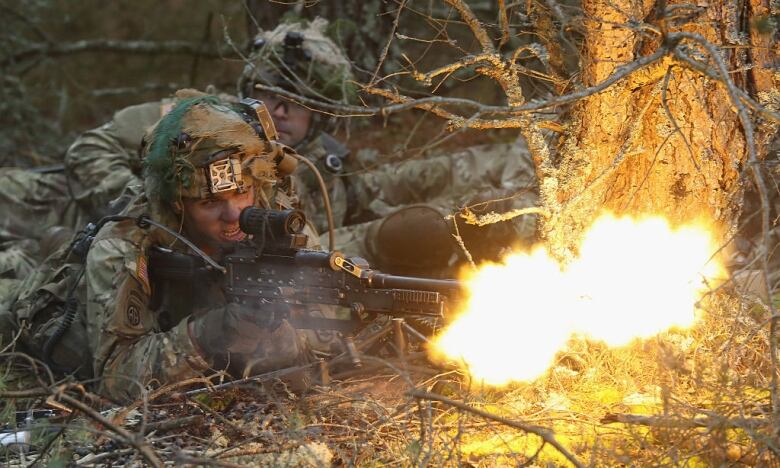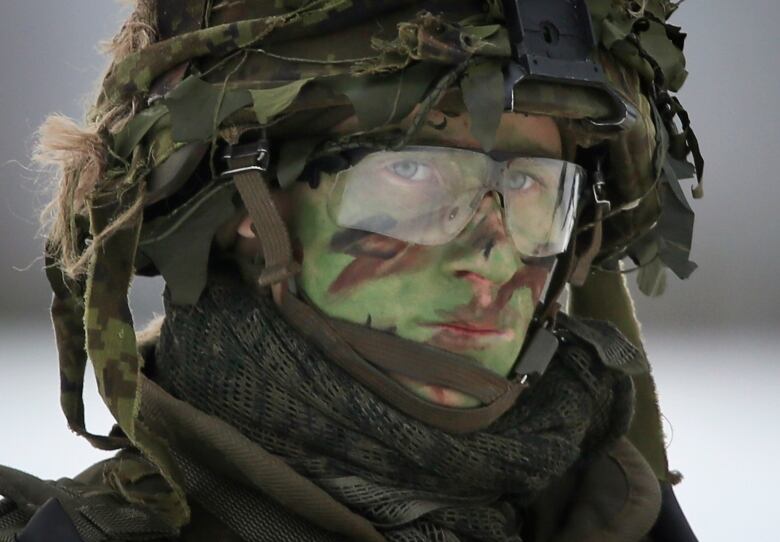NATO flexes muscles in Lithuania with an eye on Russia
Canadian snipers, U.S. infantry and other allies conduct exercises in wintry forest

Troops from 11 NATOcountries including the United States rehearsed battle skills ina snowy Lithuanian forest on Friday, and the leader of theBaltic state voiced confidence that U.S. commitment to Europe'sdefence would survive the election of Donald Trump as president.
Trump upset U.S. allies during the election campaign bypraising Russian President Vladimir Putin, describing NATO as "obsolete"and questioning whether Washington should protectEuropean allies who did not spend enough on their own defence.
- It's not your grandfather's Cold War, officials insist
- Canada considers European troop commitment as CSIS warns Russia is 'mobilizing for war'
But Lithuanian President Dalia Grybauskaite played downthose comments as she inspected some of the 4,000 allied troopstaking part in an exercise in a pine forest near the town of Pabradeand the border withBelarus including Canadian snipers, U.S. infantry and Germansoldiers with missile launchers.
"The United States has been the guarantor of peace since theSecond World War and we expect that to remain," she said.
"Things mentioned in [Trump's]election campaign we areleaving them in the past."
Underlining the point, U.S. Ambassador to Lithuania AnneHall stressed U.S. commitment to the NATO treaty clause thatcommits its members to each other's protection.
"This is a clear demonstration of NATO's interoperability,its resolve and its commitment to the collective defence. Andthe U.S. commitment to NATO's Article 5 is iron clad, and thisexercise is a good demonstration of that," she said.
In moves prompted by Russia's annexation of Crimea and itssupport for separatists in eastern Ukraine, NATO is deployingfour battalions of up to 1,000 troops each from early next yearto defend Poland and the former Soviet Baltic states ofLithuania, Latvia and Estonia.

The deployment was planned months before the election ofTrump, who unnerved the central and east Europeans by suggestingthe United States should set conditions for defending its alliesin the North Atlantic Treaty Organisation.
Moscow says it has no intention of invading the Baltics orPoland and accuses NATO of destabilizing Europe by placing U.S.missile systems in eastern Europe and moving troops closer toRussia's borders.
- Trump's NATO criticisms 'nothing new,' defence leaders say
- NATO chief sees Canada's troop commitment as 'open-ended'
NATO says its response is aimed at creating a "credibledeterrent,"citing not only the annexation of Crimea butRussia's actions in conducting unannounced snap exercises andplacing nuclear-capable missiles in its Kaliningrad region,which borders Lithuania.
A German battalion will deploy to Lithuania from February,while British, Canadian and U.S. battalions will go to Estonia,Latvia and Poland respectively. Smaller rotating contingents ofU.S. troops have been deployed across the region since Russiaseized Crimea from Ukraine in March 2014.
Asked if a Russian attack was possible, Lithuania's Chief ofDefence Jonas Zukas told Reuters: "I hope it won't be the case,but who knows? We have to be ready every day."

Just 15 kilometres from Lithuania's frontier withRussian ally Belarus, NATO soldiers in green camouflage and facepaint set off simulated explosions and fired automatic weaponsto retake a mock village from an unidentified enemy, ending thelast major exercises before next year's deployments.
No officials mentioned Russia by name during speeches to thevisiting Lithuania president. But U.S. soldiers said training sonear to NATO's eastern limits made any perceived threat morereal, especially as some had never exercised in snow conditions.
"It provides a sense of purpose, having a mission," saidU.S. Lieutenant Colonel Michael Kloepper.

NATO commanders concede next year's 4,000-strong force inthe Baltics and Poland is no match for Russia, which NATObelieves has amassed 330,000 troops near Moscow.
Russia's anti-ship and anti-missile systems in Kaliningradalready represent a major challenge for NATO planners, whileBaltic nations also want stronger air defence systems.
"Every day we need more, and every day we will have more,"Grybauskaite said.
German Brigadier General Michael Podzus said the goal wasnot to outgun Russia but to form a functioning multinationalforce and show that an attack against one is an attack againstall, underscoring NATO's founding principle which Trump calledinto question during his campaign.
"You might be right that a battlegroup will not be able tofight against an army. That's not the point," Podzus said.
"If an aggressor chose to attack this country, he would haveto deal with other countries as well. That may drive theaggressor to rethink his intent."












_(720p).jpg)


 OFFICIAL HD MUSIC VIDEO.jpg)
.jpg)



























































































